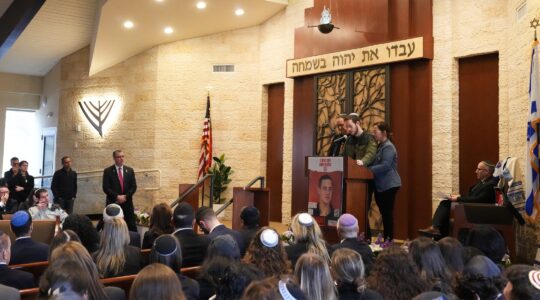JERUSALEM, Sept. 1 (JTA) — A commission of inquiry is investigating the circumstances surrounding the deaths of Israeli soldiers last week in the southern Lebanon security zone. Four soldiers were killed Aug. 28 when they were trapped in a brush fire following a battle with members of the Shi’ite Amal movement. Six other Israeli soldiers were injured. The four, who were buried over the weekend, were: Sgt. Oshri Schwartz, 19, of Or Akiva; Staff Sgt. Oren Zarif, 21, of Herzliya; Sgt. Shimon Yidag, 21, from Sderot; and Sgt. Ro’i Shukrun, 20, of Jerusalem. A fifth soldier — Sgt. Shomatu Kasahoun, 21 of Rishon le-Zion — died Monday from injuries sustained in the brush fire. Like another one of soldiers who died in the blaze — Yidag — Kasahoun had made aliyah from Ethiopia along with his family. According to an initial inquiry, members of the Israel Defense Force’s prestigious Golani Brigade spotted a unit of Amal fighters and opened fire, killing four. A fifth got away. No IDF troops were hurt, but the unit stayed in place as fighting continued in the area. IDF units were called in to give support, bombarding the area with mortar and artillery fire, which started a small brush fire. High winds quickly spread the blaze, which eventually encircled the IDF soldiers. The commission is investigating, among other things, why the troops did not immediately evacuate when they became aware of the fire. One of the surviving members of the Golani unit said that at one point, when the fire continued to near, the commander of the unit radioed for permission to leave the area, but was told to remain there until the fifth Amal gunman was killed. When the fire was only dozens of yards from the soldiers, the unit commander finally decided to give the order to evacuate. By that time, the blaze had spread to the point where it prevented some of the soldiers from escaping. The initial inquiry found that the deaths were caused by a natural catastrophe, not by any flaw in leadership or in the functioning of the troops.
JTA has documented Jewish history in real-time for over a century. Keep our journalism strong by joining us in supporting independent, award-winning reporting.





